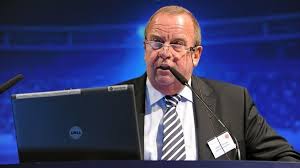By Mark Baber
March 19 – Michel D’Hooghe, chairman of FIFA’s medical committee and President of the FIFA Medical Assessment and Research Centre, has said that the abuse of anti-inflammatory medicine by football players is a bigger problem facing the sport than doping.
“The most worrying aspect,” according to D’Hooge “is that we see the problem moving ever more into the youth categories.”
At the 2010 World Cup, non-steroidal anti-inflammatories were used by 34.6% of players, up from 29% at the 2006 tournament in Germany. D’Hooghe says. “There was one team where 21 of 23 players were using them.”
At the heart of the problem is that players are required to play too many games, week-in, week-out, for club and country. Anti-inflammatories are used to enable players to continue to play on despite pain which is a warning sign that natural rest is required. FIFA medical officials have suggested players should play a maximum of 60 matches, but many players go above that.
As the medicines are available over the counter, and not on banned lists, education is seen as key. FIFA is organising a major medical conference in Marrakesh where the use of anti-inflammatories will be an important theme.
Research by EXPRO, the charity for ex-professional footballers, has shown that ex-professional footballers are 1,000 times more likely to suffer osteoarthritis in the joints than any other profession with four out of five ex-professional footballers suffering from osteoarthritis. A new research programme, which has the support of FIFA, will be looking into the effects of cortisone injections.
Contact the writer of this story at moc.l1745647753labto1745647753ofdlr1745647753owedi1745647753sni@r1745647753ebab.1745647753kram1745647753

